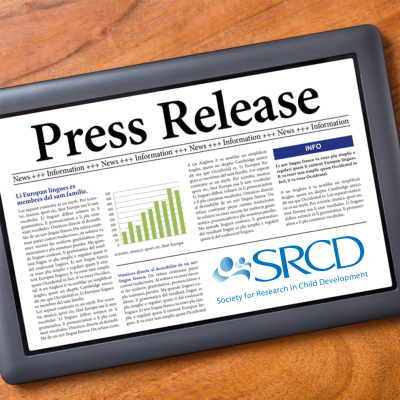Quality Counts in Adolescents' and Young Adults' Romantic Relationships
PRESS RELEASE / CHILD DEVELOPMENT: Embargoed for Release on August 18, 2015
Adolescents who have romantic relationships tend to have more problems with psychosocial adjustment. In contrast, young adults who have romantic relationships tend to have fewer problems with psychosocial adjustment. Although the links between having a romantic relationship and psychosocial adjustment change with age, a new longitudinal study has found that it’s not just having a relationship that matters, but the quality of the relationship: Higher-quality romantic relationships are associated with fewer psychosocial difficulties across adolescence and young adulthood.
The study, conducted at the University of Denver, appears in the journal Child Development.
The authors sought to understand if all adolescent romantic relationships are equally risky and if all young adult romantic relationships are equally protective. They were particularly interested in learning when in youth’s development the quality of a romantic relationship begins to be protective.
As part of the study, 100 male and 100 female tenth graders from predominantly middle- to upper-middle class neighborhoods and a range of racial and ethnic backgrounds completed questionnaires for nine years. They were asked about their romantic relationships and psychosocial functioning, including internationalizing symptoms (e.g., anxiety, depression, social withdrawal), externalizing symptoms (e.g., aggression, delinquent behavior, impulsivity), alcohol and drug use, and dating satisfaction. The researchers examined how support in the romantic relationship (e.g., being available for the other when needed, providing companionship, encouraging the other), conflict, and individuals’ perceived satisfaction with the relationship were related to those indices of psychosocial adjustment. They also looked at how the ties between qualities of romantic relationships and youth’s psychosocial adjustment changed as the youth grew into young adults.
“We found that relationships that were more supportive and satisfying, and those that had fewer negative interactions were associated with better psychosocial adjustment, above and beyond the effects of simply being in a relationship,” according to Charlene Collibee, a doctoral student at the University of Denver, who coauthored the study. “Therefore, it’s not just having a romantic relationship that’s linked to psychosocial functioning, but the nature of that relationship.”
The study also found that the links between the aspects of romantic relationships and internalizing symptoms as well as dating satisfaction strengthened as adolescents transitioned to young adulthood. “These findings are consistent with the idea that developing intimate romantic relationships is an important goal, and the significance of this goal increases as adolescents mature into young adults,” Collibee added. While the characteristics of romantic relationships were also associated with externalizing symptoms and substance use, these associations were consistent across development rather than increasing in strength with age.
“Our findings highlight the importance of romantic characteristics across development, and tell us that we should be concerned not just with whether an adolescent or young adult has a romantic relationship, but also with the quality of that relationship,” notes Wyndol Furman, John Evans Professor of Psychology at the University of Denver, the study’s other coauthor. “They also suggest that promoting high-quality romantic relationships in adolescence, and especially young adulthood, may foster more positive psychosocial development.” Indeed, findings underscore that researchers, care providers, and parents should recognize that romantic relationships are not all the same, and that the quality of the relationship is key. Furthermore, adolescents and young adults themselves should be encouraged to consider whether they are in supportive and satisfying relationships, because they are a central part of most lives and may have important consequences for health and well-being.
The Eunice Kennedy Shriver National Institute of Child Health and Human Development and the National Institute of Mental Health funded the study.
###
Summarized from Child Development, Quality Counts: Developmental Shifts in Associations Between Romantic Relationship Qualities and Psychosocial Adjustment by Collibee, C, and Furman, W (University of Denver). Copyright 2015 The Society for Research in Child Development, Inc. All rights reserved.


